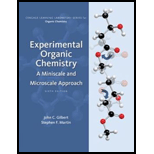
Experimental Organic Chemistry: A Miniscale & Microscale Approach (Cengage Learning Laboratory Series for Organic Chemistry)
6th Edition
ISBN: 9781305080461
Author: John C. Gilbert, Stephen F. Martin
Publisher: Brooks Cole
expand_more
expand_more
format_list_bulleted
Question
Chapter 6.2, Problem 2E
Interpretation Introduction
Interpretation:The reason for a mixture containing a highly sensitive component to acidic conditions to be subjected to a TLC analysis in which silica gel serves as the stationary phase should be explained.
Concept introduction:Thin Layer Chromatography is a sensitive chromatographic technique which used to analyze small quantities of the samples by solid-liquid adsorption method. Rectangular glass plate is coated with an adsorbent; sample to be analyzed is run on the plate in the developing chamber with the mobile phase to give spots of the analyzed sample.
Expert Solution & Answer
Want to see the full answer?
Check out a sample textbook solution
Students have asked these similar questions
6. Chlorine dioxide (CIO) is used as a disinfectant in municipal water-treatment plants. It decomposes in
a first-order reaction with a rate constant of 14 s. How long would it take for an initial concentration of
0.06 M to decrease to 0.02 M? [6 pts]
If possible, replace an H atom on the
a carbon of the molecule in the
drawing area with a methyl group
substituent, and replace an H atom
on the ẞ carbon with a hydroxyl
group substituent.
If one of the substituents can't be
added for any reason, just don't add
it. If neither substituent can be
added, check the box under the
drawing area.
en
HO
OH
Curved arrows are used to illustrate the flow of electrons. Use
the reaction conditions provided and follow the curved arrows
to draw the intermediate and product of this
hydrohalogenation reaction.
Include all lone pairs and charges as appropriate.
Br
Select to Draw
51°F
Sunny
esc
F1
HBr
Select to Draw
1,2-hydride
shift
Br
Select to Draw
Q Search
F2
F3
F4
1
2
#
#
3
DII
L
F5
F6
F
tA
$
%
Λ
Chapter 6 Solutions
Experimental Organic Chemistry: A Miniscale & Microscale Approach (Cengage Learning Laboratory Series for Organic Chemistry)
Ch. 6.2 - Prob. 1ECh. 6.2 - Prob. 2ECh. 6.2 - Prob. 3ECh. 6.2 - Prob. 4ECh. 6.2 - Prob. 5ECh. 6.2 - Prob. 6ECh. 6.2 - Prob. 7ECh. 6.2 - Prob. 8ECh. 6.2 - Prob. 9ECh. 6.3 - Prob. 1E
Ch. 6.3 - Prob. 2ECh. 6.3 - Prob. 3ECh. 6.3 - Prob. 4ECh. 6.3 - Prob. 5ECh. 6.3 - Prob. 6ECh. 6.3 - Prob. 7ECh. 6.3 - Prob. 8ECh. 6.3 - Prob. 9ECh. 6.3 - Prob. 10ECh. 6.3 - Prob. 11ECh. 6.3 - Prob. 12ECh. 6.3 - Prob. 13ECh. 6.3 - Prob. 14ECh. 6.3 - Prob. 15ECh. 6.3 - Prob. 16ECh. 6.3 - Prob. 17ECh. 6.3 - Prob. 18ECh. 6.3 - Prob. 19ECh. 6.3 - Prob. 20ECh. 6.4 - Prob. 1ECh. 6.4 - Prob. 2ECh. 6.4 - Prob. 3ECh. 6.4 - Prob. 4ECh. 6.4 - Prob. 5E
Knowledge Booster
Similar questions
- please help i cant find the article to even startarrow_forwardWhat are the missing reagents for the spots labeled 1 and 3? Please give a detailed explanation and include the drawings and show how the synthesis proceeds with the reagents.arrow_forwardhelp with the rf values i am so confusedarrow_forward
- Predict the organic reactant of X and Y that are involved in the reaction below, and draw the skeletal ("line") structures of the missing organic reactant. Please include all steps & drawings & explanations.arrow_forwardPredict the major organic product for this reaction.arrow_forwardPredict the major organic product for this reaction.arrow_forward
- Predict the major organic product for this reaction.arrow_forwardWhat are the missing reagents for the spots labeled 1 and 3? Please give a detailed explanation and include the drawings and show how the synthesis proceeds with the reagents.arrow_forwardPlease provide the complete mechanism for the reaction below and include all appropriate arrows, formal charges, and intermediates. Please draw out the answerarrow_forward
arrow_back_ios
SEE MORE QUESTIONS
arrow_forward_ios
Recommended textbooks for you
 Principles of Instrumental AnalysisChemistryISBN:9781305577213Author:Douglas A. Skoog, F. James Holler, Stanley R. CrouchPublisher:Cengage Learning
Principles of Instrumental AnalysisChemistryISBN:9781305577213Author:Douglas A. Skoog, F. James Holler, Stanley R. CrouchPublisher:Cengage Learning EBK A SMALL SCALE APPROACH TO ORGANIC LChemistryISBN:9781305446021Author:LampmanPublisher:CENGAGE LEARNING - CONSIGNMENT
EBK A SMALL SCALE APPROACH TO ORGANIC LChemistryISBN:9781305446021Author:LampmanPublisher:CENGAGE LEARNING - CONSIGNMENT

Principles of Instrumental Analysis
Chemistry
ISBN:9781305577213
Author:Douglas A. Skoog, F. James Holler, Stanley R. Crouch
Publisher:Cengage Learning

EBK A SMALL SCALE APPROACH TO ORGANIC L
Chemistry
ISBN:9781305446021
Author:Lampman
Publisher:CENGAGE LEARNING - CONSIGNMENT
